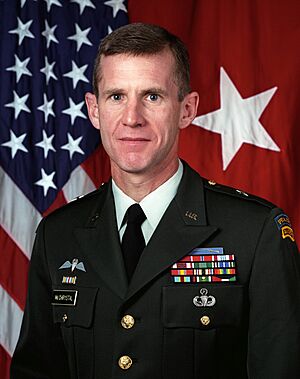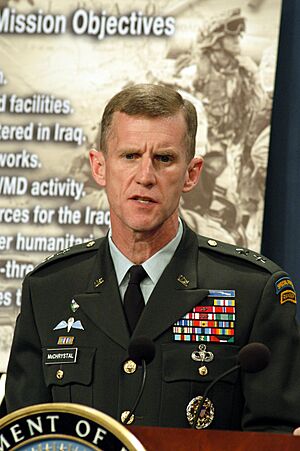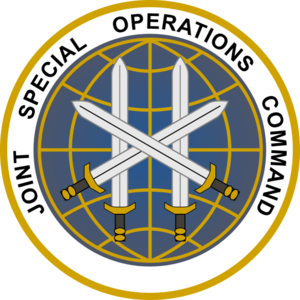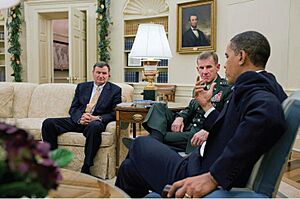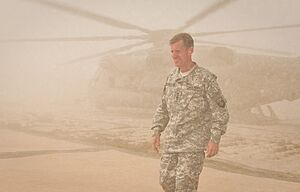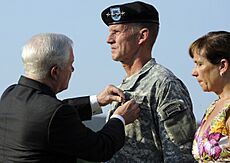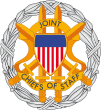Stanley A. McChrystal facts for kids
Quick facts for kids
Stanley McChrystal
|
|
|---|---|
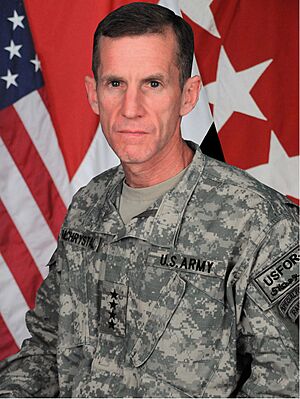
General Stanley A. McChrystal c. 2009
|
|
| Born | 14 August 1954 Fort Leavenworth, Kansas, U.S. |
| Allegiance | United States |
| Service/ |
United States Army |
| Years of service | 1976–2010 |
| Rank | General |
| Commands held |
|
| Battles/wars | |
| Awards |
|
Stanley Allen McChrystal (born August 14, 1954) is a retired United States Army general. He is well-known for leading the Joint Special Operations Command (JSOC) from 2003 to 2008. During this time, his team was involved in important missions, including finding Abu Musab al-Zarqawi, a leader of Al-Qaeda in Iraq.
Later, General McChrystal became the Commander of the International Security Assistance Force (ISAF) and U.S. Forces in Afghanistan. He held this important role from June 2009 to June 2010. Former Defense Secretary Robert Gates called him "perhaps the finest warrior and leader of men in combat I ever met."
However, General McChrystal resigned from his command in Afghanistan after a magazine article quoted him and his staff making critical comments about government officials. President Barack Obama accepted his resignation. After leaving the military, McChrystal began teaching at Yale University. He also started a consulting firm.
Contents
Early Military Career
Stanley McChrystal was born on a U.S. Army base in Kansas. He graduated from the United States Military Academy in 1976. He then became a second lieutenant in the United States Army.
His first job was with the 82nd Airborne Division. He served as a weapons platoon leader and later as an executive officer. In 1978, he went to the Special Forces Officer Course. After that, he commanded an "A-team" in the 7th Special Forces Group.
McChrystal also served in South Korea as an intelligence officer. He later commanded different companies and battalions. He attended the Naval War College and earned a master's degree in international relations. He was part of Joint Special Operations Command during Desert Shield and Operation Desert Storm in Saudi Arabia.
From 1993 to 1996, he commanded the 2nd Battalion, 504th Infantry, and then the 2nd Battalion, 75th Ranger Regiment. He helped change the Army's hand-to-hand combat training. He then commanded the entire 75th Ranger Regiment from 1997 to 1999.
Becoming a General
Stanley McChrystal was promoted to brigadier general in 2001. He served as an assistant division commander for the 82nd Airborne Division. He also worked as the chief of staff for the XVIII Airborne Corps. This included leading operations in Afghanistan during Operation Enduring Freedom.
When the Iraq War began in 2003, he was working at the The Pentagon. He was in charge of operations for the Joint Staff. He even gave televised briefings about U.S. military actions in Iraq.
Leading Special Operations
General McChrystal led the Joint Special Operations Command (JSOC) for five years. He was in charge of JSOC from September 2003 to August 2008. This role meant he directed special operations, especially in Iraq. His work there was very important.
One early success was the capture of Saddam Hussein in December 2003. McChrystal was promoted to lieutenant general in 2006.
JSOC is a very secret part of the U.S. military. McChrystal became more well-known in June 2006. His forces were responsible for the death of Abu Musab al-Zarqawi. Zarqawi was the leader of Al-Qaeda in Iraq. After an airstrike, McChrystal went to the site to help identify the body.
McChrystal's team was criticized for some of its methods. This included accusations of mistreating detainees at a place called Camp Nama. After the Abu Ghraib torture and prisoner abuse scandal, many members of the task force faced consequences. McChrystal later said that mistreating detainees hurt America's efforts.
He was also criticized for his role after the death of Pat Tillman. Tillman was a former football player and Army Ranger. He died in 2004 from friendly fire. McChrystal was told about the friendly fire incident quickly. He was involved in the paperwork to give Tillman a medal. The medal recommendation did not mention friendly fire. McChrystal sent a memo warning that the details of Tillman's death might cause embarrassment if they became public. He was one of several officers recommended for discipline, but no action was taken against him.
Later, JSOC and CIA teams launched new operations in Iraq. These operations helped capture or kill many key al-Qaeda leaders. Many officials said these joint efforts were very important in defeating al-Qaeda in Iraq.
Director of the Joint Staff
In 2008, General McChrystal was nominated to be the director of the Joint Staff. This is another high-ranking position. His approval by the United States Senate was delayed. Senators wanted more information about how detainees were treated under his command. After meeting with him, the Senate approved his appointment in May 2008. He became director in August 2008.

Leading Forces in Afghanistan
In June 2009, McChrystal was approved by the Senate to lead forces in Afghanistan. He was promoted to general. Soon after he took command, a large military operation called Operation Khanjar began. This was a major offensive for NATO forces.
Afghanistan Report
General McChrystal sent a report to Defense Secretary Robert Gates. In the report, he asked for more troops in Afghanistan. He said that the war could be lost without more soldiers. However, he also said that success was still possible.
Troop Increase Suggestions
In 2009, McChrystal publicly suggested that 30,000 to 40,000 more troops were needed in Afghanistan. This was seen as the safest option to achieve success. Some people criticized him for making these suggestions public.
Rolling Stone Article and Resignation
In a Rolling Stone magazine article, General McChrystal and his staff were quoted making critical comments about government officials. These officials included Vice President Joe Biden. McChrystal was not directly critical of the president. However, his aides' comments showed disappointment with President Obama.
The White House noticed these comments. McChrystal called Vice President Biden to apologize. He also issued a written statement. He said his comments were a "mistake reflecting poor judgment." He added that he had "enormous respect and admiration for President Obama."
President Obama asked McChrystal to come to a meeting at the White House. During this meeting on June 23, 2010, McChrystal offered his resignation. President Obama accepted it. President Obama then nominated General David Petraeus to take McChrystal's place in Afghanistan.
McChrystal released another statement. He said he strongly supported the president's strategy. He resigned out of respect for his commitment to the mission.
Retirement from the Army
Soon after leaving his command in Afghanistan, General McChrystal announced his retirement from the Army. He was allowed to keep his four-star rank in retirement. His retirement ceremony was held on July 23, 2010. He received the Distinguished Service Medal and the Defense Distinguished Service Medal.
Pentagon Investigation
The Defense Department inspector general looked into the Rolling Stone article. The investigation found no evidence of wrongdoing by McChrystal or his team. The report also questioned the accuracy of some parts of the article. It stated that some events or comments were not exactly as reported.
After the report was made public, McChrystal was asked to lead a new advisory board. This board supports military families. It is an initiative led by First Lady Michelle Obama and Jill Biden.
Life After the Military
In 2010, after retiring from the Army, McChrystal joined Yale University. He became a senior fellow at the Jackson Institute for Global Affairs. He teaches a course called "Leadership" to graduate students and some undergraduates.
He also joined the boards of directors for JetBlue Airways and Navistar International. McChrystal is the chairman of Siemens Government Technologies. He is also a partner at McChrystal Group, a consulting firm he co-founded in 2011. This firm uses the slogan "Bringing Lessons from the Battlefield to Boardroom."
In 2011, McChrystal joined the advisory board of Spirit of America. This organization helps Americans serving abroad and the local people they work with.
His memoir, My Share of the Task, was published in January 2013. In 2015, his second book, Team of Teams, was released. This book is for business organizations and leaders.
In 2016, McChrystal became the chair of the Board of Service Year Alliance. This group wants to make a year of full-time service a common opportunity for young Americans. He believes national service can help build trust and responsibility.
He also joined the board of directors for FiscalNote in 2016. In May 2016, he gave a speech at The Citadel and received an honorary degree.
Before the 2016 presidential election, McChrystal said he would not consider any role in a Donald Trump administration. He later endorsed Joe Biden in the 2020 presidential election and Kamala Harris in the 2024 presidential election.
McChrystal has a chapter with advice in Tim Ferriss' book Tools of Titans. In May 2025, he released another book called On Character: Choices That Define a Life.
Family Life
Stanley McChrystal's father, Major General Herbert J. McChrystal, was also a military general. His grandfather was also a U.S. Army Colonel. Stanley is one of six children, and all of them served in the military or married someone in the military. His older brother, Scott McChrystal, was an Army chaplain.
McChrystal married Annie Corcoran in 1977. She also came from a military family.
| Insignia | Rank | Date |
|---|---|---|
| 2LT | 2 June 1976 | |
| 1LT | 3 June 1978 | |
| CPT | 1 August 1980 | |
| MAJ | 1 July 1987 | |
| LTC | 1 September 1992 | |
| COL | 1 September 1996 | |
| BG | 1 January 2001 | |
| MG | 1 May 2004 | |
| LTG | 16 February 2006 | |
| GEN | 15 June 2009 |
Awards and Honors
General McChrystal received many awards and decorations during his military career. These show his bravery and service.
|
|
||||||||||||||||||||||||||||||||||||||||||||||||||||||||||||||||||||
See also
- The Operators (book)
- War Machine (film)
 | Kyle Baker |
 | Joseph Yoakum |
 | Laura Wheeler Waring |
 | Henry Ossawa Tanner |


